
Die Fledermaus is an operetta composed by Johann Strauss II to a German libretto by Karl Haffner and Richard Genée, which premiered in 1874.

Walter Davis Pidgeon was a Canadian-American actor. A major leading man during the Golden Age of Hollywood, known for his "portrayals of men who prove both sturdy and wise," Pidgeon earned two Academy Award nominations for Best Actor, for his roles in Mrs. Miniver (1942) and Madame Curie (1943).

Catherine Rosalind Russell was an American actress, model, comedian, screenwriter, and singer, known for her role as fast-talking newspaper reporter Hildy Johnson in the Howard Hawks screwball comedy His Girl Friday (1940), opposite Cary Grant, as well as for her portrayals of Mame Dennis in the 1956 stage and 1958 film adaptations of Auntie Mame, and Rose in Gypsy (1962). A noted comedienne, she won all five Golden Globes for which she was nominated. Russell won the Tony Award for Best Actress in a Musical in 1953 for her portrayal of Ruth in the Broadway show Wonderful Town. She was nominated for the Academy Award for Best Actress four times during her career before being awarded a Jean Hersholt Humanitarian Award in 1973.

Jean Rogers was an American actress who starred in serial films in the 1930s and low–budget feature films in the 1940s as a leading lady. She is best remembered for playing Dale Arden in the science-fiction serials Flash Gordon (1936) and Flash Gordon's Trip to Mars (1938).
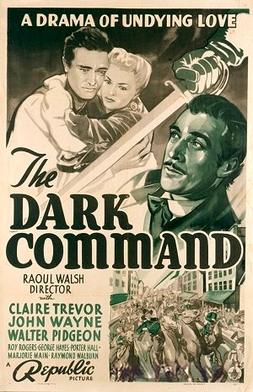
Dark Command is a 1940 Crime western film starring Claire Trevor, John Wayne and Walter Pidgeon loosely based on Quantrill's Raiders during the American Civil War. Directed by Raoul Walsh from the novel by W. R. Burnett, Dark Command is the only film in which western icons John Wayne and Roy Rogers appear together, and was the only film Wayne and Raoul Walsh made together since Walsh discovered Wayne working as a prop mover, renamed him, and gave him his first leading role in the epic widescreen Western The Big Trail a decade before.

The Revolt of Mamie Stover is a 1956 American DeLuxe Color romantic drama film directed by Raoul Walsh and produced by Buddy Adler from a screenplay by Sydney Boehm, based on the 1951 novel of the same name by William Bradford Huie. The picture stars Jane Russell and Richard Egan, with Joan Leslie, Agnes Moorehead, and Michael Pate, and was filmed in CinemaScope. The music was by Hugo Friedhofer and the cinematography by Leo Tover, with costume design by Travilla.

Saratoga is a 1937 American romantic comedy film starring Clark Gable and Jean Harlow and directed by Jack Conway. The screenplay was written by Anita Loos. Lionel Barrymore, Frank Morgan, Walter Pidgeon, and Una Merkel appear as featured players; Hattie McDaniel and Margaret Hamilton appear in support. It was the sixth and final film collaboration of Gable and Harlow.

The Shopworn Angel is a 1938 American drama film directed by H. C. Potter and starring Margaret Sullavan, James Stewart and Walter Pidgeon. The MGM release featured the second screen pairing of Margaret Sullavan and James Stewart following their successful teaming in the Universal Pictures production Next Time We Love two years earlier.

Julia Misbehaves is a 1948 American romantic comedy film starring Greer Garson and Walter Pidgeon as a married couple who are separated by the man's snobbish family. They meet again many years later, when the daughter whom the man has raised, played by Elizabeth Taylor, invites her mother to her wedding. The film also features Peter Lawford and Cesar Romero.

The Wineville Chicken Coop murders, also known as the Wineville Chicken murders, were a series of abductions and murders of young boys that occurred in the city of Los Angeles and in Riverside County, California, United States between 1926 and 1928. The murders were perpetrated by Gordon Stewart Northcott, a 19-year-old farmer who had moved to the U.S. from Canada two years earlier, as well as his mother, Sarah Louise Northcott, and his nephew, Sanford Clark.
Walter Conrad Collins was a 9-year-old American boy who went missing in 1928.

Party Wire is a 1935 drama film starring Jean Arthur and Victor Jory. It was based on the novel of the same name by Bruce Manning. In a small town, an overheard conversation on a telephone party line results in gossip that causes a great deal of trouble for a young woman and a wealthy man.
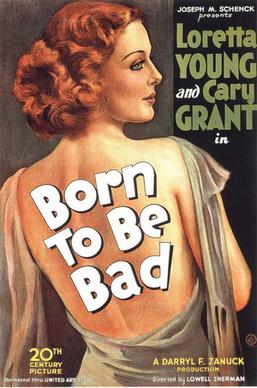
Born to Be Bad is a 1934 American pre-Code drama film starring Loretta Young and Cary Grant, and directed by Lowell Sherman.

Mourning Becomes Electra is a 1947 American drama film by Dudley Nichols adapted from the 1931 Eugene O'Neill play Mourning Becomes Electra, based in turn on the Oresteia. The film stars Rosalind Russell, Michael Redgrave, Raymond Massey, Katina Paxinou, Leo Genn and Kirk Douglas.

Man-Proof is a 1938 American romantic comedy film directed by Richard Thorpe. The film is based on the 1937 novel The Four Marys written by Fannie Heaslip Lea.

Tell It to the Judge is a 1949 American romantic comedy film directed by Norman Foster and starring Rosalind Russell as a divorcee who tries to get back her ex-husband, played by Robert Cummings.
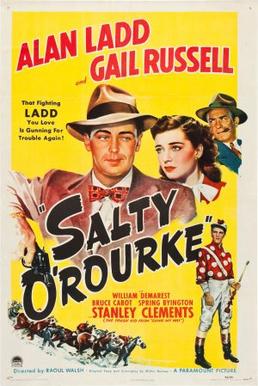
Salty O'Rourke is a 1945 American sports drama film directed by Raoul Walsh and starring Alan Ladd, Gail Russell and William Demarest. Produced and distributed by Paramount Pictures, it was nominated for an Academy Award in 1946.
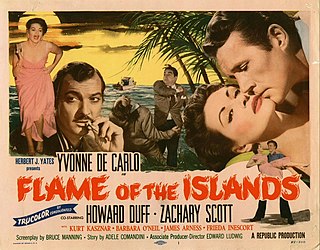
Flame of the Islands is a 1956 American film noir crime film directed by Edward Ludwig and starring Yvonne De Carlo, Howard Duff, and Zachary Scott. Shot in Trucolor, it was produced and distributed by Republic Pictures.

Two Against the World is a 1932 American pre-Code drama film directed by Archie Mayo and starring Constance Bennett, Neil Hamilton and Helen Vinson. Bennett plays a woman who tries her best to keep her sister and brother out of trouble. It is based on the play A Dangerous Set by Marion Dix and Jerry Horwin. It was produced and distributed by Warner Brothers. The film, as well as Unashamed (1932), is based on a Philadelphia society murder by Eddie Allen, who killed Francis Donaldson III in an "honor killing". It was a box office success, making $562,000 in profit for the studio.
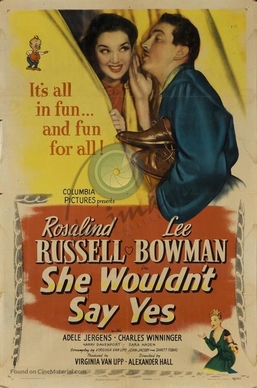
She Wouldn't Say Yes is a 1945 American screwball comedy film directed by Alexander Hall and starring Rosalind Russell, Lee Bowman and Adele Jergens. It was produced and distributed by Columbia Pictures.




















